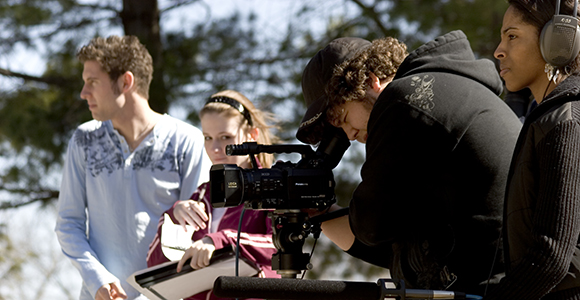
(Photo Credit: AiClassEland/Wikimedia)
Working in the entertainment industry is a dream for thousands, but getting a start in the business is not as easy as arriving in Hollywood and knocking on doors. There is a myriad of reasons people get hired or not, which range from nepotism to being at the right place at the right time. But one way to have an advantage is to get training.
That’s why Dan Watanabe, a veteran of the entertainment industry, created the Entertainment Pathway Boot Camp. The ten-week course is held at Los Angeles Valley College, which also offers community college students a pathway to the entertainment industry through Associate’s Degrees and Occupational Certificates in Broadcasting, Cinema and Media Arts.
“Business has needs that are very solid and the communication between what colleges are teaching and businesses need is often blurry,” said Watanabe. He added that there needs to be better communication between the two to make sure that the courses being taught are useful in the business world. The Entertainment Pathway Boot Camp links students directly with working professionals so they learn what is needed for today’s job market.
Watanabe is an adjunct faculty at LAVC and Deputy Sector Navigator for the California Community College's workforce development division, called Doing What Matters for Jobs & the Economy, which is supporting the boot camp.
The entertainment program is a good example of linking industry needs and college programs, one of the recommendations of Doing What Matters' new Strong Workforce Program, which emphasizes developing industry-informed career pathways that better prepare students for jobs within regional labor markets. The Program, support by the Summit, received $200 million in the 2016-17 state budget to develop and implement strategies to strengthen California’s workforce.
“Community colleges play a critical role in upskilling not only youths, but adults of all ages,” said Van Ton-Quinlivan, vice chancellor for Workforce and Economic Development at the California Community Colleges. “The shelf life of skills has gotten shorter and shorter. We all need to stay relevant in this fast-changing economy.”
Entertainment industry veteran Greg Zekowski created the boot camp with Watanabe. “One thing that came out as we honed the program, is that everybody believes they want to get into the business.” But Zekowski wants students to understand that this can be the beginning of a long career. “They look past the first credits on a movie and see there are a thousand people on the credits that can make a living at this and a very good living that can last until you don’t want to do it anymore.”
Boot camp participants will learn technical skills and will produce their own project throughout the course. But equally as important, they will learn interpersonal or “soft” skills, as Zekowski explained, “Make yourself valuable and know how to exist in the environment, not just because you know how to put on a belt and an earpiece, but also they can know how the set dynamic works, they know what the structure of the film set is.” Soft skills are not only valuable on a film set, but can be translated to almost any business environment.
The boot camp is free and open to LAVC students, high school students and the general public. It attracts a diverse group of students of different ethnicities, gender and ages (from high school age to older adult). Most students will attend all ten sessions, while some will attend only those that pertain to their specific interest, such as writing or animation.
At the end of the ten week course, students will leave with an online blog of their work, a personalized career guide, a job-ready portfolio, a skill certificate, a 21st Century Skills Badge and, perhaps the most valuable, contacts with not only the industry professionals who presented, but fellow classmates who are the future of the industry.
The ten week boot camp is a good example of that as it teaches students what it takes to be a successful production assistant on the set, in the front office or in post-production (production assistant is a catchall title for the entry level position on a film or television production). They get practical information from industry professionals from directors and cinematographers to executives and producers. There is also a section on entrepreneurship, as many jobs in the industry are freelance, which requires workers to be their own business.
Watanabe describes why this program is important on many levels, “The number one reason is because the entertainment touches literally every other industry in the Southland. There are any number of industries that are related to entertainment that you wouldn’t even dream that are related.” He added that set decorators can also work in the real estate industry as home stagers, graphic artists can work in advertising or writers can move into sales.
Creating the Entertainment Pathway Boot Camp is an example of effectively aligning education and business, which is one of the recommendations of the action plan contained in the Summit's Roadmap to Shared Prosperity. The Strong Workforce Program and more workforce efforts like it will be discussed at the upcoming 2016 California Economic Summit to be held in Sacramento December 13-14. Registration information and the agenda can be found here.
For Zekowski, working in the entertainment industry is a dream come true: “It didn’t matter what the job was, I just did it and I had fun. For me, the idea that I get to work in the business and get paid is like Candyland.”

